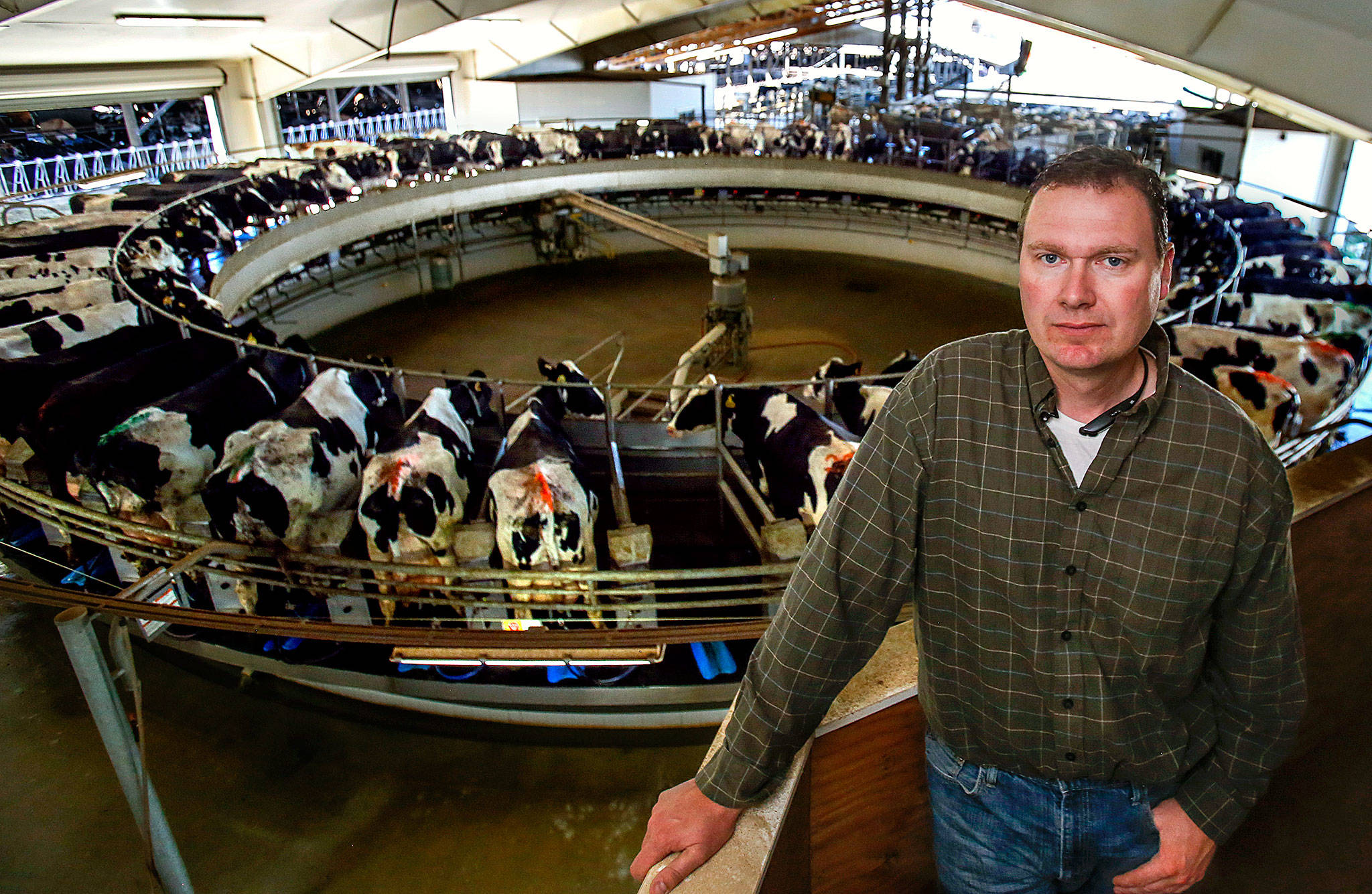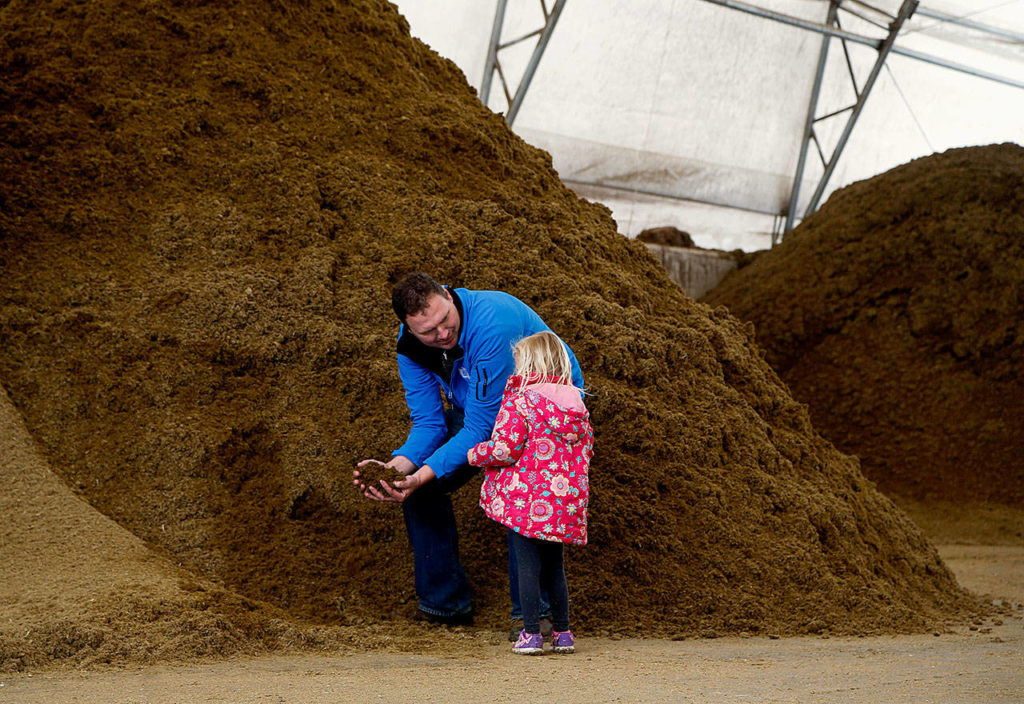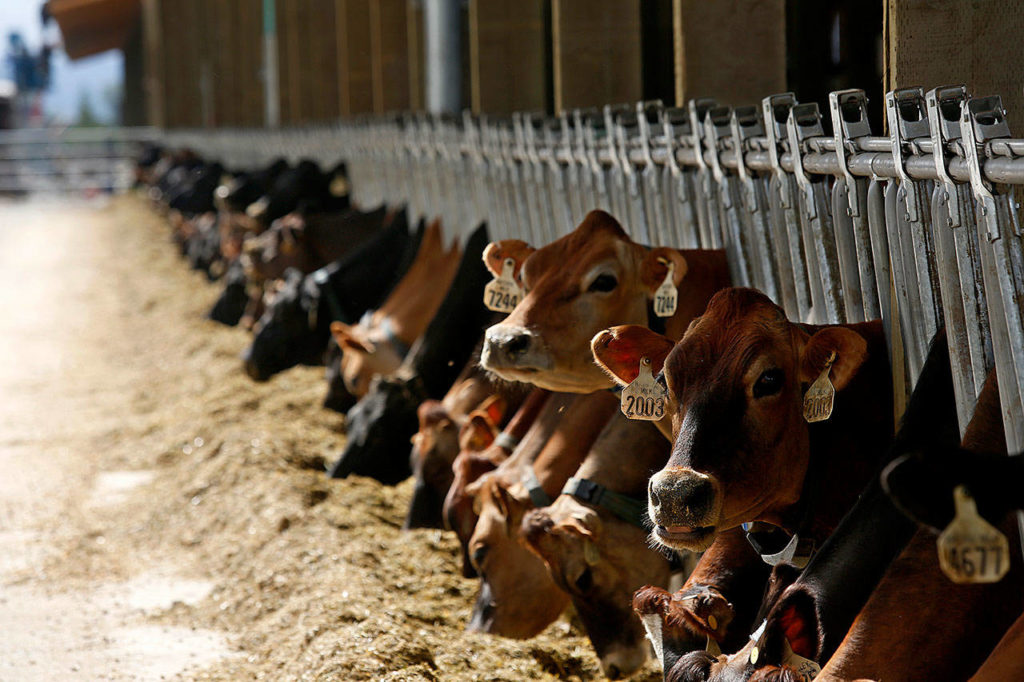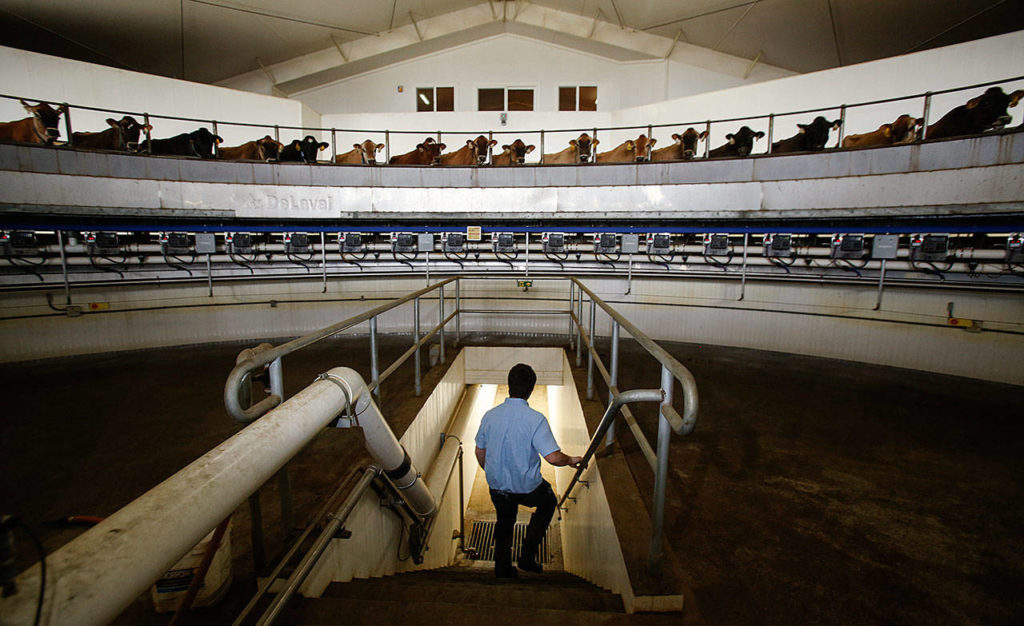STANWOOD — Cows circle slowly on a carousel where they are cleaned and milked. They’re unfazed by attention, whether it’s from the farm workers or an excited 4-year-old and her older siblings just home from school.
In a nearby barn, automated scrapers clean manure from the floor every couple of hours. From there, fiber is separated from the wet waste and composted. Piles of the soft, dry composted fibers sit in a white canvas hoop barn for a few days before being used as bedding for the cows. The remainder of the manure is bound for a lagoon. It might be used on this farm as fertilizer or transported to others that grow feed.
Fourth-generation farmer Jeremy Visser plans to add another step to waste processing at his dairy, where 2,000 cows produce about 20,000 gallons of milk a day. He’s looking to put in a system developed by Sedro-Woolley based Janicki Bioenergy. It’s new technology, not yet tested on a working farm.
Visser aims to be the first. He’s partnered with the Stillaguamish Tribe, Snohomish Conservation District, Washington State University and the Dairy Farmers of Washington. They say the system could be a game-changer for how dairies process waste and protect water.
They’re seeking a $2 million federal Conservation Innovation Grant and some state funding to install and test an Advanced Distillation and Nutrient Separation Processor.The Dairy Farmers of Washington pledged $250,000 toward the multimillion-dollar project.
The goal is to learn if it’s a realistic option to help dairy farmers reclaim wastewater instead of simply managing manure on their land.
“We want to do the right stuff for the watershed,” Visser said. “But if this is the next step, I don’t want it to be something that is cost prohibitive.”
Here’s how it works: At least half of the wet waste that currently goes to the lagoon would instead go into the new machine. A process that relies on heat would separate the waste. More than 90 percent of the end product would be distilled, reusable water. The other byproducts are a dry, fibrous substance that could be used for bedding or in potting soil, and a concentrated liquid fertilizer containing nutrients from the manure.
The water should be safe for animals to drink, said Jeff Graf, in business development at Janicki.
“It completes the cycle,” Visser said. “Our cows would drink the water and produce milk and manure.”
Visser has been working with the Stillaguamish Tribe and the conservation district for about four years to improve how local dairies manage waste. They wanted to put in a digester, technology that has been around for years and captures methane gas from manure to generate energy. They hoped for something multiple farms could use. It wasn’t penciling out.
“We were at kind of a standstill this time last year,” said Brett de Vries, with the conservation district. “We had a willing landowner and supporters of this concept, but we just couldn’t get anywhere because of the economics.”
When Janicki Bioenergy first approached Visser, he hesitated. He’s met his fair share of snake oil salesmen, he said. He went to the lab to see the system. The more he learned, the more excited he got. He reached out to his partners.
“I told them, ‘You’ve got to see this,’ ” he said. “This is a unicorn. It’s got to be too good to be true.”
From that moment last summer until now, it’s been a whirlwind.
The creators at Janicki gained confidence to pursue waste processing technology for dairies after seeing success with a different system: the Omni Processor, which won support from the Bill &Melinda Gates Foundation. The Omni Processor handles human waste and has been touted as a way to turn it into energy and clean water in developing countries. A video of Bill Gates drinking water produced by the system went viral online. Visser jokes that his cows will have the option to sip their water like Gates.
For the Stillaguamish Tribe, the processor could provide a new way to protect the watershed and Port Susan. The tribe hopes to improve water quality for shellfish, environmental manager Pat Stevenson said. High levels of fecal pollution make shellfish unsafe to eat. The state Department of Health recently detected contamination in Port Susan.
Stevenson hopes the new processor is practical for farmers.
“I’m sure there’s going to be tweaks, like anything when it’s brand new and first worn,” he said. “But if we could get something like that processor installed and get the fecals off the farm, I think things would be a lot better.”
If grant money comes through, Visser hopes to install the equipment in late September or early October. That’s an ambitious timeline, de Vries said, but could be done if funding is available.
If not, there’s enough interest that Erin Vincent, with the Dairy Farmers of Washington, believes the project will move forward somehow.
Visser is optimistic, but acknowledges it’s risky. The system could be too expensive to operate day-to-day. The costs of installing, running, maintaining and monitoring the equipment are expected to be steep, but he hopes the benefits will balance things out. He anticipates less storage and transportation costs for manure, plus he’d have the reclaimed water and fertilizer. The expenses and actual output of the system once it’s on the farm need to be studied.
“You’ve got a little bit of fear, but I’d be lying if I said there wasn’t some fear if I just kept things the way we’ve been doing it for years,” Visser said. “This isn’t going to be a solution for every dairy farm, but it’s going to be an option.”
Kari Bray: 425-339-3439; kbray@heraldnet.com.
Talk to us
> Give us your news tips.
> Send us a letter to the editor.
> More Herald contact information.




























